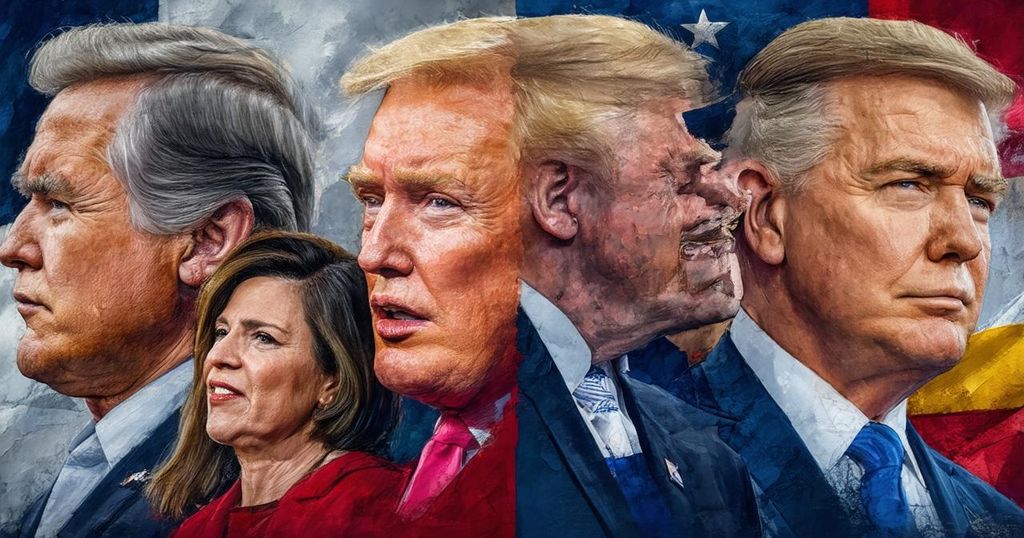Political Landscape: Trump Campaigns in Arizona While Harris and Obama Rally in Georgia
As the election approaches, former President Trump campaigns in Arizona while Vice President Harris and former President Obama are active in Georgia. Trump’s recent gaffe about the presidency and ongoing discussions surrounding his comments on Hitler draw sharp critiques from Harris. A violent incident in Arizona highlights rising tensions, as discussions of fascism and political violence dominate the narrative, with candidates intensifying their campaign efforts amidst public scrutiny.
As the political landscape intensifies, former President Donald Trump heads to Arizona while Vice President Kamala Harris and former President Barack Obama campaign in Georgia in the final days leading up to the election. With only twelve days left until the vote, musician Bruce Springsteen joins Harris in Atlanta amidst a tight race reflected in recent polls. The Harris campaign criticized Trump for mistakenly attributing blame for the crisis in the Middle East to former President Obama instead of the current President, Joe Biden, as highlighted in a social media post: “Trump confuses who is currently president, forcing Fox host to correct him: ‘You mean President Biden.'” President Biden, aged 81, has withdrawn from the race due to concerns regarding his advanced age following a poorly received debate earlier this year. The Harris campaign is capitalizing on Trump’s frequent gaffes as part of a strategy to raise concerns about the former president’s age, who is currently 78. While Trump embarks on a campaign rally in Waterford, Michigan, his running mate has been actively engaging in this critical battleground state, where public opinion polls indicate a competitive race between Trump and Harris. The Republican candidate recently visited Hamtramck, where he praised the support from the city’s Yemeni-American mayor. In sharp contrast, Harris has vocally criticized Trump, particularly in light of his reported comments regarding Adolf Hitler, calling him “unhinged and unstable.” Trump, in recent statements, indicated he would dismiss the federal prosecutor investigating his attempts to overturn the 2020 election outcome if victorious in November, further complicating the ongoing political discourse. Amidst these developments, a significant incident arose in Arizona where an individual allegedly opened fire on the Democratic National Committee’s office, leading to grave concerns about political violence. This incident underlines the heightened tensions present in the political arena as noted by various commentators, including Congressman Eli Crane, who criticized Harris for her language, suggesting it incites violence. The ongoing debate over whether Trump fits the definition of fascism has resurfaced, with General John Kelly, Trump’s former chief of staff, suggesting that Trump’s rhetoric aligns with fascist ideology, a perspective that has incited notable backlash from Trump and his supporters. As the campaign progresses, the issues of American exceptionalism and the ongoing conflict in Gaza remain focal points in the discourse, with Harris advocating for a balanced approach aimed at achieving a two-state solution, while facing criticism regarding continued U.S. arms support to Israel. As the political narrative unfolds, both R parties are fortified in their campaigning strategies as they grapple with age, accountability, and the pressing need for unity amidst a politically charged era.
The current political climate in the United States is marked by heightened tensions and intense strategic campaigning between major political figures. With the upcoming election in close proximity, candidates are actively participating in rallying their bases, raising awareness of their political agendas, and critiquing their opponents. The debate over age, political rhetoric, and ongoing global conflicts such as the situation in Gaza play pivotal roles in shaping voter opinions and party strategies. The discourse has also been influenced by past comments made by Trump regarding historical figures, further complicating his campaign amid allegations of fascism. As multiple candidates engage in battleground states, the campaign strategies evolve in response to public opinion polls indicating a competitive electoral environment, particularly in states like Georgia and Michigan.
In conclusion, the final days leading up to the election are characterized by aggressive campaigning and heightened tensions between the candidates. The interplay of age-related concerns, allegations of political violence, and discussions on historical comparisons in rhetoric have become central themes in this election cycle. As Trump and Harris intensify their outreach efforts in critical states, the overall atmosphere remains charged, reflecting broader societal tensions and the complexities of American political discourse in today’s context.
Original Source: www.aljazeera.com




Post Comment